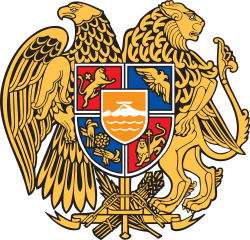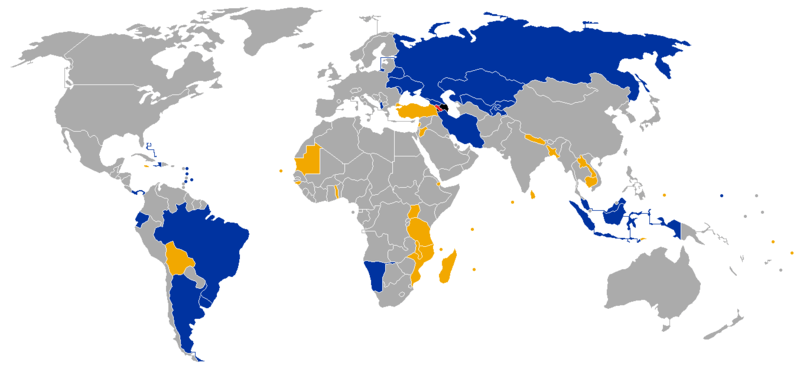Armenian nationality law

Armenian nationality law is based primarily on the principle of jus sanguinis. It was adopted on November 6, 1995 and was amended in 2007 which permitted dual citizenship.
Acquisition of Armenian citizenship
The citizenship of the Republic of Armenia is acquired:
- through recognition of citizenship;
- by birth;
- through acceptance into citizenship;
- through the restoration of the citizenship;
- through acceptance into citizenship by group;
- by the basis provided by the international treaties of the Republic of Armenia.
It includes the right of return for members of the Armenian diaspora.
Birth
A child born in Armenia acquires the citizenship of the Republic of Armenia if:
- the parents hold Armenian citizenship at the moment of the child's birth regardless of the place of the birth;
- one parent holds Armenian citizenship at the moment of the child's birth, whilst the other parent is unknown or stateless.
If, at the moment of child's birth, one of the parents holds an Armenian citizenship and the other parent is a foreign citizen, the determination of the child's citizenship is based on a written consent of both parents.
A child of stateless persons who was born in the territory of the Republic of Armenia acquires citizenship of the Republic of Armenia.
Recognition
The following persons are recognised as citizens of the Republic of Armenia:
- Citizens of the former Arm. SSR permanently residing on the territory of the Republic of Armenia, who until the enactment of the Constitution, have not acquired citizenship of another State or have rejected that citizenship;
- Stateless persons or former citizens of other USSR republics who are not foreign citizens, permanently residing in the RA and before 31 December 2003, have applied for the acquisition of the RA citizenship (amended on 20 March 2002);
- Former citizens of the Armenian SSR, who live outside the Republic of Armenia and have not acquired citizenship of another country (amended on 12 April 2001).
Naturalisation
Any person who does not have an Armenian citizenship may be granted citizenship of the Republic of Armenia if he/she:
- is aged 18 or over;
- has resided legally in Armenia for the last 3 years;
- is proficient in the Armenian language;
- is familiar with the Constitution of the Republic of Armenia.
A person who does not hold Armenian citizenship can be granted citizenship of the Republic of Armenia without the condition of the term of residence, if he/she:
- marries a citizen of the Republic of Armenia or has a child, father or mother who are citizens of the Republic of Armenia; or
- has parents or at least one parent that had held citizenship of the Republic of Armenia in the past or had been born on the territory of the Republic of Armenia and had applied for the citizenship of the Republic of Armenia within 3 years from becoming 18 years old; or
- is Armenian by his origin and has resided in the territory of the Republic of Armenia.
The person accepting the citizenship of the Republic of Armenia is to read the text of the oath in Armenian and sign it .
Dual citizenship
Dual citizenship has recently been authorised after the constitutional amendment of the Armenian Citizenship Law No. 75-N on February 26, 2007. All male dual citizens regardless where they live are required to serve in the military as if they were Armenian resident citizen with certain exceptions. Most male Armenian citizens living outside of Armenia do not return to serve in the military. Armenian citizenship does not end simply because your passport expires or Armenian citizen lived outside of Armenia for extended period of time. Armenian citizen must submit a paper application to renounce his or her citizenship, go through a process and be approved. The child of 2 Armenian citizen parents, regardless of his or her place of birth, acquires Armenian citizenship. Foreign born male Armenians get in trouble with the law when they visit Armenia, because they held Armenian citizenship without knowledge and failed to show up and register to serve in the military. There now exists an option to do civil service instead of military, but civil service takes 46 months instead of 24 in the military and those who are interested must apply early. Those who have reached 27 and did not serve, may pay a fine of about $4500, and avoid prosecution for evading military service. Always consult with an experienced attorney who specializes in Armenian citizenship before speaking to Armenian government officials.
Visa requirements

In 2015, Armenian citizens had visa-free or visa on arrival access to 52 countries and territories, ranking the Armenian passport 83rd in the world according to the Visa Restrictions Index.
See also
- Armenian diaspora
- Armenians in Syria
- Armenians in Iraq
- Armenians in Iran
- Armenians in Turkey
- Armenians in the Middle East
External links
http://arka.am/en/news/society/parliament_to_extend_amnesty_for_cash_scheme_for_military_dodgers/
